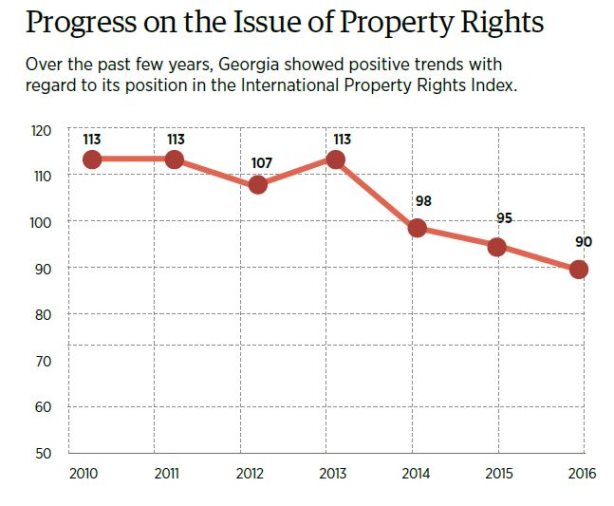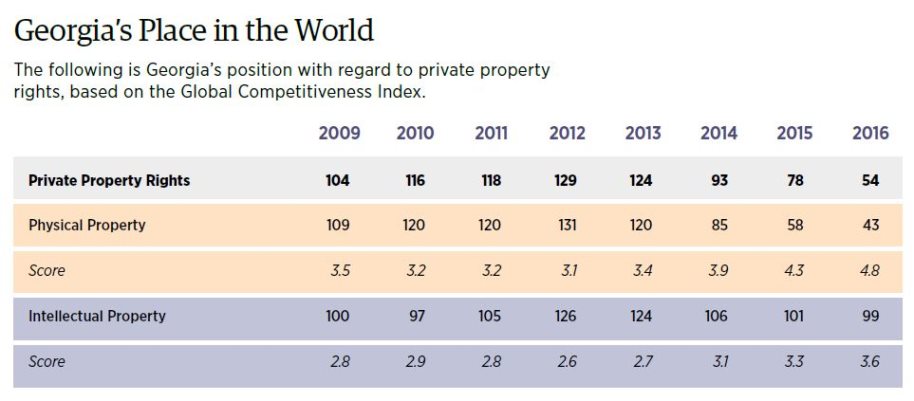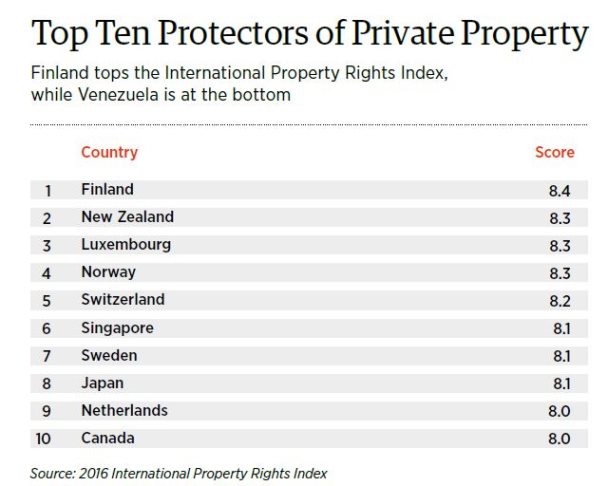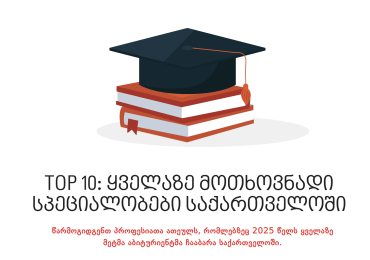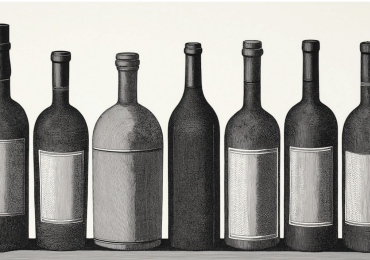Since 2004, Georgia has achieved significant progress in various international rankings. This applies especially to the Economic Freedom Index, where the country holds the 13thposition and the Ease of Doing Business Index (16th). However, inadequate protection of property rights remains a problematic issue for the business environment in Georgia. This is an unfortunate fact, since well-protected property rights constitute one of the most important (if not the most important) factors for a country’s economic development. Various international organizations conduct studies regarding the protection of private property in various countries around the world. The results of the studies are published in the country rankings.
First, we will look at the International Property Rights Index, which is published annually by the US-based Property Rights Alliance. Based on the aforementioned index, Georgia ranked 90th among 128 countries in 2016, with a score of 4.6 points out of a possible 10 – the same as Russia, Kenya, Mali, Malawi, Tanzania, Uganda and Guatemala.
The International Property Rights Index consists of three main components, which are: legal and political environment (LPE), physical property rights (PPR) and intellectual property rights (IPR).
Georgia fares worst in terms of the protection of intellectual property rights, scoring 2.4 points out of 10 and placing 125th out of 128 countries. One of the IPR’s subcomponents is copyright protection, where Georgia scores just 1 point out of 10 and ranks 102nd out of 104 countries where copyright data is available.
Georgia’s situation is considerably better with regard to physical property rights, where it has 5.9 points and ranks 55th. Assessment criteria for PPR include protection of physical property, registering property, and access to loans.
With regard to the protection of physical property, Georgia scored 5.6 points and is ranked 55th. As for the ease of registering property, it scored a full 10 points and topped the rankings. The country fared much worse in terms of access to loans, where it only took 2.6 points and ranked 99th. Access to loans is considered a property right, since owners would be forced to sell their properties if they run into financial difficulties and struggle to obtain a loan.
In terms of the country’s legal and political environment, Georgia has 5.4 points, placing it 48th among 128 countries. The assessment criteria for this category include judicial independence, rule of law, political stability, and control of corruption. In this particular case, the Property Rights Alliance relies on World Bank data for its assessment.
Judicial independence is measured in terms of the judiciary’s freedom from interference by government or business groups. Georgia has 5.2 points and occupies the 52nd spot in the rankings. The rule of law includes equality before the law, crime levels, quality of police work and other similar issues. Here, Georgia has 5.4 points and once again ranks 52nd. In terms of political stability, Georgia scores 4.5 points and occupies the 80thspot. Finally, with regard to corruption control, Georgia ranks 34th with 6.5 points.
By analyzing the components of the index, one can see that Georgia ranks 90thmainly due to poor protection of intellectual rights. Conversely, in terms of protection of physical property, as well as the legal and political environment, the country fares reasonably well. However, one must also bear in mind that the index only covers 128 countries, and Georgia’s positions would be worse if all countries were included.
On the positive side, Georgia has been showing encouraging trends over the last few years. Georgia first appeared in the International Property Rights Index in 2010 and placed 113th with 3.7 points. By 2013, the country’s score had grown to 4.2 points, although it remained 113th overall. From 2014, Georgia has been consistently improving its positions.
Finland currently leads the International Property Rights Index with 8.4 points, followed by New Zealand, Luxembourg and Norway with 8.3 points each. Venezuela occupies the bottom spot with 2.7 points.
Property rights constitute one of the key components of the Global Competitiveness Index, which is compiled by the influential Swiss-based World Economic Forum (WEF), whereby questionnaires are sent out directly to hundreds of businesses operating in Georgia. Respondents must indicate how well physical and intellectual property rights are protected in the country, giving marks of 1 to 7, with 7 being the best score.
The study conducted in 2016 (as of March-April) included data from 138 countries. Georgia occupied the 54th spot with a score of 4.4 points. It ranked 43rd with 4.8 points in terms of physical property rights, and 99thin terms of intellectual property rights. Although being ranked 54th and scoring 4.4 points does not reflect a high level of protection of property rights in the country, improvement by 75 positions over a period of 4 years constitutes a good result. Over the same period, Georgia improved by 88 positions in the physical property rights index, and by 27 positions in the intellectual property rights index. It should also be noted that between 2010 and 2012, Georgia’s position in the rankings had actually worsened, with the country being close to the bottom of the index.
Based on the Global Competitiveness Index, private property is best protected in Switzerland and Finland (6.5 points out of 7), followed by Luxembourg, Singapore and Sweden. Once again, Venezuela ranks at the bottom with a score of 1.8 points.
The issue of protection of private property is being studied by the Heritage Foundation – another influential US-based organization – which annually publishes the Economic Freedom Index, where the protection of private property constitutes one of the assessment criteria. It is precisely in this category that Georgia fares worst, scoring 55.1 points out of a possible 100. Even though Georgia is ranked 13th overall in the Index of Economic Freedom, it only holds the 77th spot (out of 185 countries) in the separate category of property rights. In this case, property rights are assessed through analyzing the existing laws and practices in the country. Issues that are taken into consideration include physical property rights, intellectual property rights, investor protection, property expropriation risks and land administration (freedom to buy and sell).
Based on the Economic Freedom Index, property is best protected in Singapore, which scored 97.1 points out of 100, followed by New Zealand (96.1 points), United Kingdom (93.8 points) and Hong Kong (93.7 points). Yet again, Venezuela sits at the bottom with 6.8 points.
Based on the aforementioned three indexes, we can conclude that improving property rights remains a major challenge for the business environment in Georgia. To this end, the following two crucial steps must be taken: First, existing laws must be better enforced, and the effectiveness of the judiciary must be enhanced. Second, more legislative guarantees must be established with regard to property rights. For example, the possibility of the expropriation of private property by the state ought to be virtually eliminated, or made as difficult as possible.


